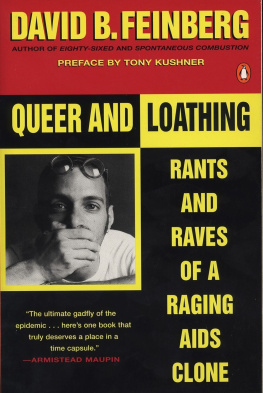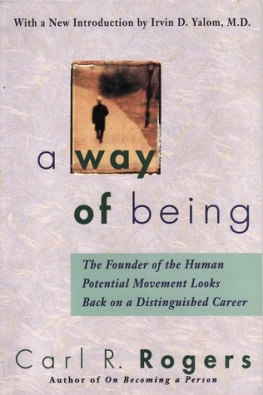Public and Professional Attitudes Toward AIDS Patients
Public and Professional Attitudes Toward AIDS Patients
A National Dilemma
Cornell University Medical College Fifth Conference on Health Policy
Edited by
David E. Rogers and Eli Ginzberg
First published 1989 by Westview Press, Inc.
Published 2019 by Routledge
52 Vanderbilt Avenue, New York, NY 10017
2 Park Square, Milton Park, Abingdon, Oxon OX14 4RN
Routledge is an imprint of the Taylor & Francis Group, an informa business
Copyright 1989 by Cornell University Medical College
All rights reserved. No part of this book may be reprinted or reproduced or utilised in any form or by any electronic, mechanical, or other means, now known or hereafter invented, including photocopying and recording, or in any information storage or retrieval system, without permission in writing from the publishers.
Notice:
Product or corporate names may be trademarks or registered trademarks, and are used only for identification and explanation without intent to infringe.
Library of Congress Cataloging-in-Publication Data
Cornell University Medical College Conference on Health Policy (5th : 1989 : New York, N.Y.)
Public and professional attitudes toward AIDS patients : a national dilemma / Cornell University Medical College Fifth Conference on Health Policy; edited by David E. Rogers and Eli Ginzberg.
p. cm.
Includes bibliographical references.
ISBN 0-8133-7861-3
1. AIDS (Disease)PatientsUnited StatesPublic opinionCongresses. 2. AIDS (Disease)Government policyUnited StatesCongresses. 3. AIDS (Disease)PatientsCareUnited StatesCongresses. I. Rogers, David E. (David Elliott), 1926II. Ginzberg, Eli, 1911- . III. Title.
RA644.A25C67 1989
362.1'9697'9200973dc20
89-22462
CIP
ISBN 13: 978-0-367-28463-3 (hbk)
Contents
, David E. Rogers
, Eli Ginzberg
, Kenneth M. Ludmerer
, Robert J. Blendon and Karen Donelan
, M. Roy Schwarz
, Gayling Gee
, Troyen A. Brennan
, Thomas Killip
, Bruce C. Vladeck
, Theodore Cooper and Robin Weiss
, Richard N. Gottfried
, Lewis Thomas
, David E. Rogers
Guide
David E. Rogers
This volume analyzes in considerable depth how fears, prejudices, social and moral values, and individual perceptions have affected and shaped the public, the personal, the professional, and the economic ways in which our society interacts with people suffering from human immunodeficiency virus (HIV) infections. A central consideration is how well our society has responded to this dreadful epidemic that initially emerged primarily among two groupsgay men and intravenous (IV) drug userswhose life-styles are distasteful or condemned by many in our society.
Chapters explore how well our society has handled frightening epidemic plagues in the past; what characterizes public attitudes toward people with acquired immune deficiency syndrome (AIDS) today, after nine years of experience with the disease; how health professionals feel about patients with HIV infections; and how they are coping personally both with patients and with their own concerns about transmission of the virus. Other chapters consider how hospitals, ethicists, lawyers, and public officials are reacting to the medical crisis of our times.
It has been painfully apparent to all of us who have worked in this area that our first nine years of experience with AIDS have some powerful lessons to teach us. As has been true with all epidemics during recorded human history, our response to AIDS has been a result of the play of many forcesrumors, science-based knowledge, social values, religious beliefs, local mores, and the political tenor of the times. But with AIDS there have been some notable differences. Thanks to the remarkable advances we have made in basic biomedical science during the past several decades, we know vastly more about the infectious agent, how to detect its presence, and what it does to the human organism than was true of any previous plague. But, paradoxicallyand in part because of the rapid acquisition of knowledge about the particular groups of people among whom AIDS first emergedsocial attitudes and judgmental values have tended to overwhelm science-based knowledge in determining our response to the epidemic.
In modern society we have come to expect medical science to speedily develop technical solutions to problems of illness. Usually, we absorb such technological fixes swiftly and easily. So it was a keen disappointment when, early on, there was clear evidence that there would be no easy or rapid biomedical answerno antiviral agent or vaccineto solve the problem of AIDS. However, there was evidence that education leading to behavioral change and appropriate responses at a social and political level could help control the spread of the disease. Still, for the reasons already outlined, educational and behavioral responses have been difficult to set in motion and implement. Though we adapt rapidly to new technologies, change is slow when it involves altering our attitudes, our values, and our social and behavioral patterns.
This volume focuses on exploring in considerable detail changes in attitudes and behavior that must occur if we are to respond adequately to the AIDS epidemic. We must learn to deal more effectively with the fears, prejudices, and mind-sets that have too often blocked our progress in coping with AIDS.
This publication expresses many insights about how our society can soften the harshness with which it has dealt with people with AIDS and how we can be more effective in controlling the disease. Despite the enormous individual efforts expended so far to care for those ill and dying with HIV infection, the public response to the HIV epidemic has been tragically slow, too little, and too lacking in urgency. This book aims to show how the American people can cope better and more generously with the scourge of AIDS as well as to strengthen support for those responsible for our public health. Over the long haul, our society may well be judged by how well it responds to this all-too-human crisis. It deserves our best efforts.
1
An Overview
Eli Ginzberg
The principal goals of this introductory chapter are to provide the reader with some background for the selection of the theme for the Fifth Cornell University Medical College Conference on Health Policy; to highlight the major thrusts of the ten conference papers; and to call attention to gains in understanding that took place as the result of lively discussions among the authors of the papers and the participants over the two-day conference.
The fourth Cornell conference, held in February, 1988, addressed "The AIDS Patient: An Action Agenda." Sixteen speakers from federal, state, and local government, and from the nongovernmental sector, attempted to focus the attention of the public and decision-makers on the growing problems that AIDS patients and the community confront as the epidemic continues to spread.
In planning the conference for 1989, David Rogers and I recognized that one important dimension of an effective response to the AIDS crisis was the need to consider the relationship between the AIDS patient and the health professional. The centrality of the relationship was underscored by the following: reports of growing shortages of professional personnel, particularly nurses and support personnel; reports of difficulties that New York teaching hospitals faced in attracting residents because a growing proportion of their medical-surgical beds were filled with AIDS patients; surveys and other reports indicating the reluctance of some health personnel to treat and care for AIDS patients because of fears of infection or strong distaste for the life-styles that had led these patients to contract the disease; and complex problems in the therapeutic environment including the difficulties of maintaining the confidentiality of patients' records, the need for strict infection-control methods, the complexities entailed in constructing and financing long-term care facilities in urban areas in the face of neighborhood opposition, and an array of additional problems in establishing and expanding adequate systems of care for different groups of AIDS patients. This list of problem areas in the relationship between the AIDS patient and health professionals provides the rationale for the fifth Cornell conference.












